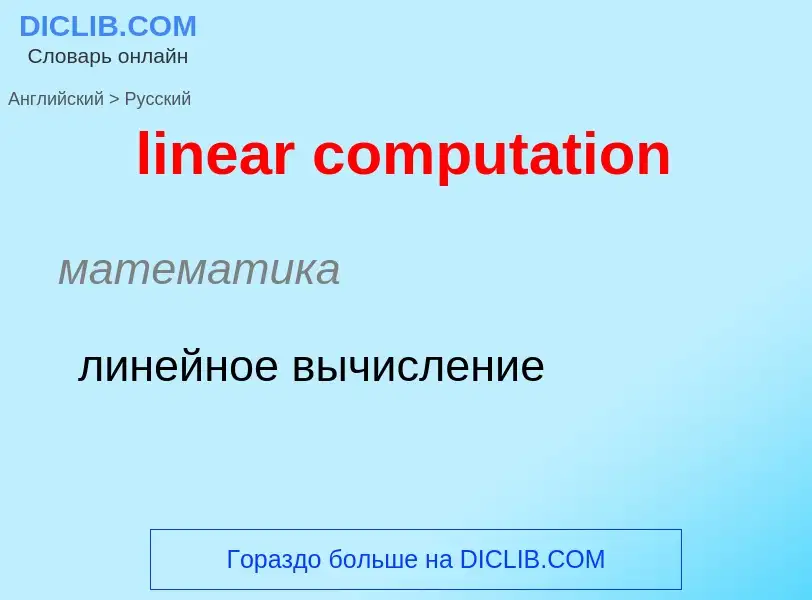Перевод и анализ слов искусственным интеллектом ChatGPT
На этой странице Вы можете получить подробный анализ слова или словосочетания, произведенный с помощью лучшей на сегодняшний день технологии искусственного интеллекта:
- как употребляется слово
- частота употребления
- используется оно чаще в устной или письменной речи
- варианты перевода слова
- примеры употребления (несколько фраз с переводом)
- этимология
linear computation - перевод на русский
математика
линейное вычисление
['liniətrænsfə'meiʃ(ə)n]
общая лексика
линейное преобразование
Определение
Википедия
Numerical linear algebra, sometimes called applied linear algebra, is the study of how matrix operations can be used to create computer algorithms which efficiently and accurately provide approximate answers to questions in continuous mathematics. It is a subfield of numerical analysis, and a type of linear algebra. Computers use floating-point arithmetic and cannot exactly represent irrational data, so when a computer algorithm is applied to a matrix of data, it can sometimes increase the difference between a number stored in the computer and the true number that it is an approximation of. Numerical linear algebra uses properties of vectors and matrices to develop computer algorithms that minimize the error introduced by the computer, and is also concerned with ensuring that the algorithm is as efficient as possible.
Numerical linear algebra aims to solve problems of continuous mathematics using finite precision computers, so its applications to the natural and social sciences are as vast as the applications of continuous mathematics. It is often a fundamental part of engineering and computational science problems, such as image and signal processing, telecommunication, computational finance, materials science simulations, structural biology, data mining, bioinformatics, and fluid dynamics. Matrix methods are particularly used in finite difference methods, finite element methods, and the modeling of differential equations. Noting the broad applications of numerical linear algebra, Lloyd N. Trefethen and David Bau, III argue that it is "as fundamental to the mathematical sciences as calculus and differential equations",: x even though it is a comparatively small field. Because many properties of matrices and vectors also apply to functions and operators, numerical linear algebra can also be viewed as a type of functional analysis which has a particular emphasis on practical algorithms.: ix
Common problems in numerical linear algebra include obtaining matrix decompositions like the singular value decomposition, the QR factorization, the LU factorization, or the eigendecomposition, which can then be used to answer common linear algebraic problems like solving linear systems of equations, locating eigenvalues, or least squares optimisation. Numerical linear algebra's central concern with developing algorithms that do not introduce errors when applied to real data on a finite precision computer is often achieved by iterative methods rather than direct ones.




